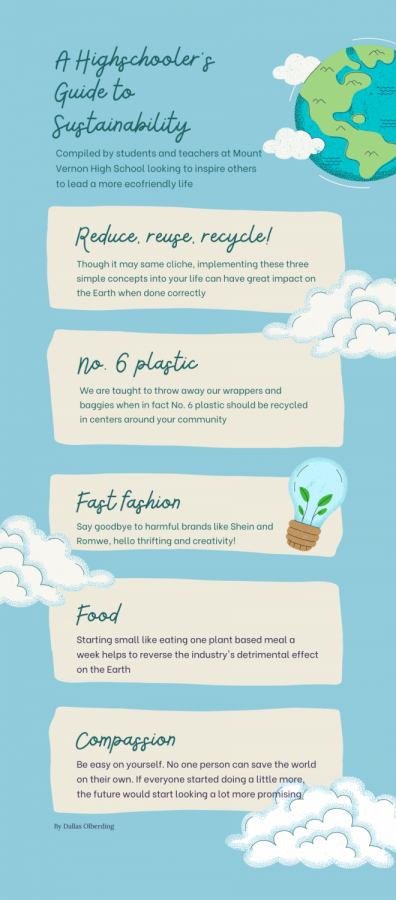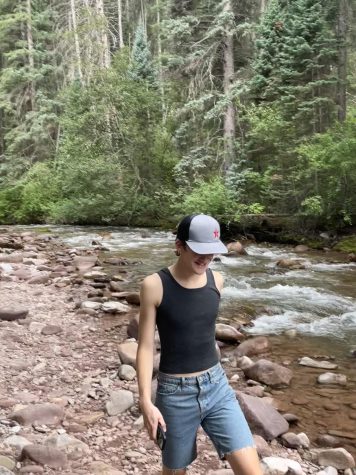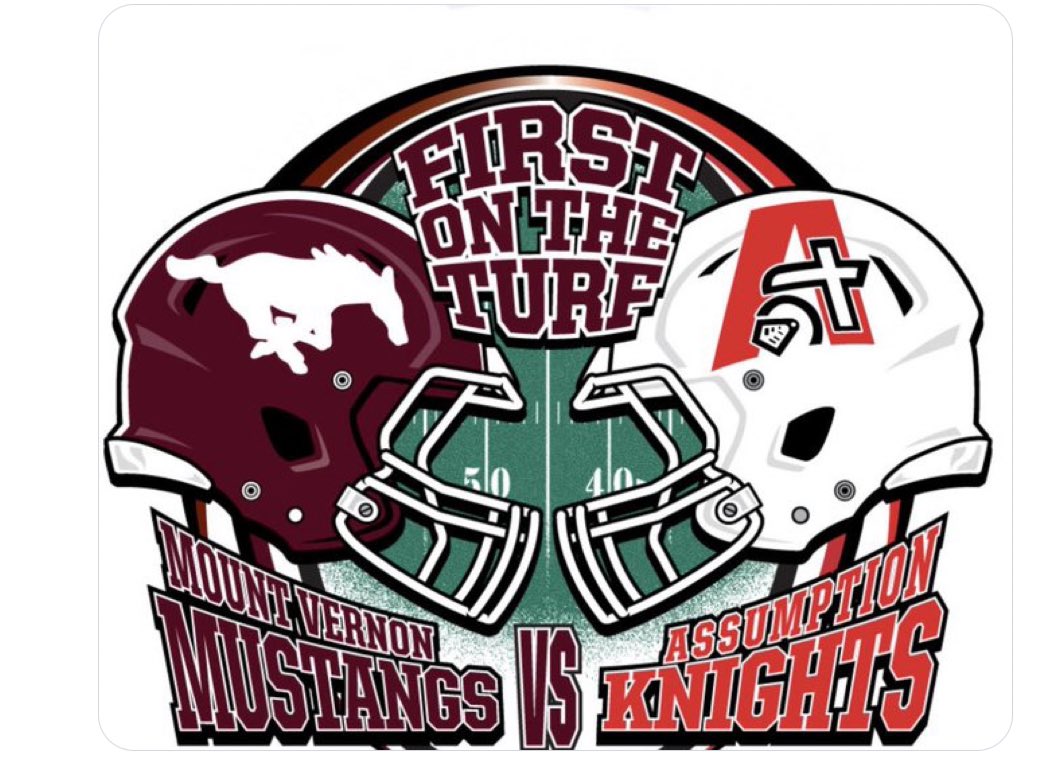A Highschooler’s Guide to Sustainability
Compiled by students and teachers at Mount Vernon High School looking to inspire others to lead a more ecofriendly life
November 16, 2021
Thick impenetrable smog takes to the atmosphere, trapping in temperatures sure to be unforgiving. Polar ice caps liquefy to crystal blue oceans taken over by ignorant human debris. Species already struggling to survive are cast aside, while their hopes of living and thriving are diminished.
Living a 100% sustainable and eco-friendly life in 2021 is challenging, especially for teenagers. We are burdened with the mess our parents and grandparents made in regards to quite literally everything — most prominent, the state of our earth. With fossil fuels prosperous, ocean levels rising, ice melting and species dying off, the thought can get to be suffocating at times. You may be asking yourself continually “What can I do to help?” but wondering how it would ever make any kind of impact. Junior Becca Conrad understands how the first few steps can be overwhelming. “Don’t let it get the best of you, go slow and be kind with yourself. Don’t put all of your mental energy into the environment without helping yourself first.” Luckily, classmates and teachers here at Mount Vernon High School hold just the right amount of digestible tips and tricks that have worked for them and can hopefully work for you and your lifestyle. Here are four major realistic and attainable ways you can be a more conscious and overall better inhabitant of this Earth — because we only have one.
Reduce, Reuse, Recycle
“Reduce, reuse, recycle.” This catchphrase has been around for decades now, something you probably heard tossed around in the elementary school classroom. Whether or not it has actually helped to minimize the harmful impact civilization has on this earth is debatable. Art teacher Bonnie Ahrens notices that times have changed, however, as attention has shifted from individual responsibility to holding big corporations accountable with the rise of Gen Z activism.
Senior Kasia Wiebel realizes too that the government is talking about the issue of climate change, but ultimately says that we cannot wait for government action. “We are definitely the generation that will change the way we live. Everyone is aware but not implementing change within their own homes, it can’t just be the government.”
So what can you do other than voting and protesting to help save our earth? It is important to not underestimate “reduce, reuse, recycle” because the actions taken from this message can benefit the earth in great strides. Ahrens reviews the ways in which she is eco-friendly in the classroom setting, proving that “reuse” is key. She uses a lot of reclaimed items for art pieces and even storage containers, and reduces disposable products by using things like cloth rags instead of paper towels.
Conrad says that she picks up a lot of trash and litter around the community, recycling what can be recycled on her own time. This paired with composting and supporting sustainable brands like 4 Ocean and Blue Land serve as a great example for highschoolers.

Wiebel suggests looking into buying from sustainable brands as well, especially in the bathroom. “I recycle a lot and use reusable grocery bags, but I just try to buy as many plastic and package free products as possible. When I run out of a certain product, I look at how I can replace it with something more eco friendly.” Let’s not underestimate the power and impact “reduce, reuse, recycle” can have!
No. 6 Plastic
Ten million tons of plastic are dumped in our oceans annually. That’s equal to more than a garbage truck load every minute according to https://www.plasticoceans.org. One major aspect of recycling that is a common misconception within our country is what you can and cannot put in the blue bin. Conrad is frustrated by the misinformation surrounding the topic of No. 6 plastic. Conrad is the founder of the renowned business Revamped, where she collects and transforms trash and litter from around the area into beautiful pieces of jewelry in hopes of influencing people to become more eco conscious. Conrad is very well educated on everything sustainability, and is pushing others to become more informed. No. 6 plastic is basically everything that the general public deems “un-recyclable”. However, Conrad confirms that all of your candy wrappers, ziploc bags and grocery sacks in fact can be part of the recycling process! She says to collect all of your No. 6 plastic and take them to Gary’s as well as centers in Lisbon that will collect your waste in an Earth friendly way! This is an easy and affordable way to significantly decrease waste in your life, helping to minimize your carbon footprint and maximize the future potential of our earth.
Fashion
The term “fast fashion” might have popped up on your Instagram stories over the past year or two, labeling brands like Shein and Romwe as huge contributors. The fast fashion industry is the second largest consumer of water, requiring about 700 gallons of water to produce just one cotton shirt and 2,000 gallons of water to produce a pair of jeans according to https://www.earth.org. Students like junior Abbie Morf as well as Conrad and even Ahrens can all agree that this is a big problem that teenagers specifically interact with. Morf said that she mainly shops secondhand, and that 50% of her closet comes from thrift stores because of her problems with fast fashion. “Fast fashion is a huge issue with trends cycling through so quickly and online stores being backed by unethical labor and production,” Morf said.
Conrad also urges teenagers to rather study trends within fashion at the time and try to replicate that with materials you already own. This cuts down on fast fashion because of their huge reliance on trends, it utilizes things already existent and is more financially conscious! Conrad says that if you are going to buy from fast fashion brands, try to purchase basics that are timeless and will never go out of style so you are not wasting your finances as well as Earth’s resources. Morf even suggests to get together with friends and swap clothes that you aren’t wearing to stay far away from those harmful corporations.
Food
Without meat and dairy consumption, global farmland use could be reduced by more than 75% — an area equivalent to the US, China, European Union and Australia combined — and still feed the world according to https://theguardian.com. With the rise of veganism even in the last decade, plant based options are practically mainstream. Morf said that she is a vegetarian herself, watching the amount of meat that she interacts with. “Specifically the beef and fish industry are huge contributors to fossil fuel emission and excessive amounts of unnatural animal production. Eat less meat, even if it’s not 100% of the time.” She suggests students just be more mindful of their eating habits, even if you eat one meal a week that doesn’t consist of meat.
Though the simple change in lifestyle may be small, any sort of action helps. Wiebel says that she buys a lot of organic foods to better impact her health as well as the health of the earth, even though it’s difficult. “I definitely am not perfect, as a household living with my parents, it’s hard when things are more expensive. Strive for improvement, not perfection!” These words echo Morf’s message, showing that no matter how small the change implemented, you can still be part of the bigger movement to save this earth.
It is important to take these lifestyle changes with a grain of salt. What works for some may not necessarily work for others as everyone comes from different backgrounds and life experiences. As Conrad said earlier, you need to take care of yourself before you start taking care of others. However, we have a deadline and can still prevent irreversible change from occurring, but change doesn’t just happen without work from everybody everywhere. In conclusion, it is all about balance. Slowly change one small aspect of your life at a time until you are living a lifestyle that works for you as well as the earth — on track to hopefully keep humans and nature in harmony with each other for generations to come.










